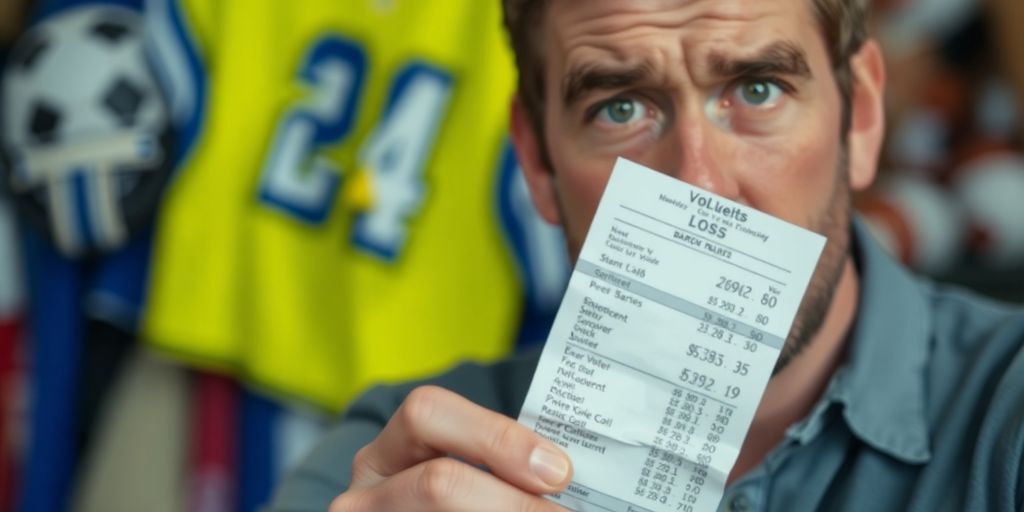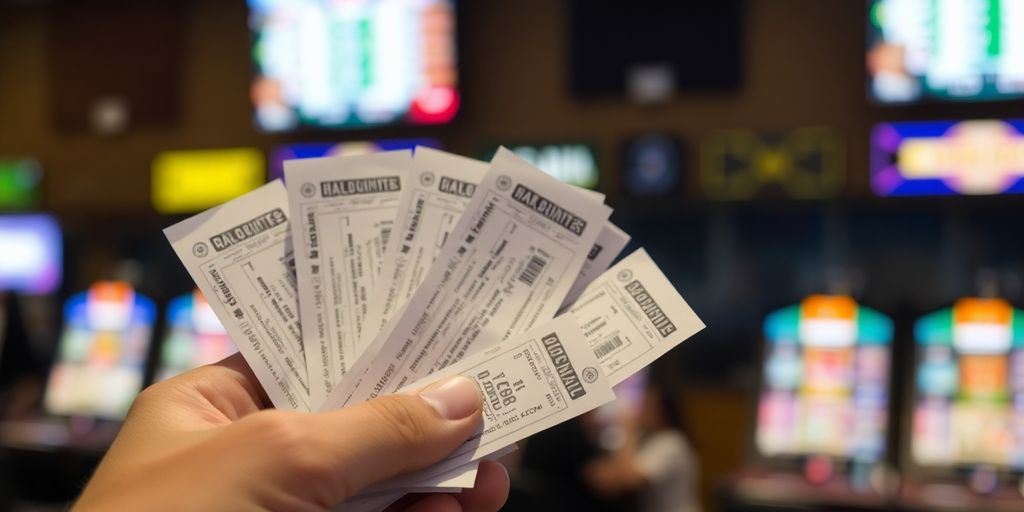Betting on sports can be a fun way to get more into the games you watch. But, it’s easy to make mistakes, especially when you’re just starting out. Lots of people lose money because they don’t know how to spot a bad line in sports betting. This guide will help you avoid those common errors so you can bet smarter.
Key Takeaways
- Don’t just follow popular streamers or influencers; always do your own research to back up any tips you hear. Hype doesn’t win games, performance does.
- Look beyond just team names. Factors like map pools, player role changes, and recent team form are super important for predicting outcomes.
- Avoid betting based on emotions or past loyalty. Stick to the facts and what the data tells you, not just who you want to win.
- Manage your money wisely. Don’t bet too much on a single game, and spread your bets out to reduce overall risk.
- Always compare odds from different sportsbooks. Getting the best possible odds can make a big difference in your long-term winnings.
Understanding Market Shifts and Hype
It’s easy to get caught up in the excitement surrounding a big match or a popular team. But sometimes, that excitement is just noise, and it can really mess with your betting decisions. You see a bunch of people on social media talking about how a certain team is going to dominate, or a streamer you like mentions they’re putting money on a specific outcome. Suddenly, everyone’s piling in, and the odds start to shift. This isn’t always because new, solid information has come out. Often, it’s just hype. People follow the crowd, or they want to be part of the buzz, and that can create lines that don’t really reflect the actual probabilities.
The Influence of Popular Streamers on Betting
So, you’re watching your favorite streamer play a game, and they casually mention, “Yeah, Team Alpha is looking really strong in practice matches, I’m putting a bit on them.” Next thing you know, a bunch of their viewers, who trust their opinion, start placing bets on Team Alpha. This can cause the odds to move, not because of any deep statistical analysis, but simply because a popular personality said something. It’s like a ripple effect, but it’s driven by popularity, not necessarily by actual performance data. You have to ask yourself if you’re betting based on what the streamer said, or if you’ve done your own homework.
Distinguishing Hype from Data-Driven Insights
This is where things get tricky. Hype is that feeling you get when everyone’s talking about something, and it feels like a sure thing. Data-driven insights are based on actual numbers, past performance, player stats, and how teams match up against each other. For example, a team might have a flashy win streak, but if you look at the data, maybe they only beat weaker opponents, or their star player is showing signs of fatigue. The real value is in finding those bets where the data suggests an advantage, even if the public is focused elsewhere. It’s about looking past the noise and finding the signal.
Verifying Tips with Independent Research
If you hear a tip, whether it’s from a streamer, a friend, or a forum, your first step should always be to do your own research. Don’t just take someone’s word for it. Look at the team’s recent performance, check their head-to-head record against the opponent, and see if there are any roster changes or player injuries. Does the tip make sense when you look at the actual numbers? If a streamer says a team is a lock, but your research shows they’ve been struggling on a particular map or against a certain playstyle, you need to trust your research over their opinion. It’s about building your own confidence in a bet, not just following someone else’s lead.
Analyzing Game-Specific Factors
When you’re looking at a game, it’s not just about who’s the favorite on paper. There’s a whole lot more going on under the hood that can totally change how a game plays out. You gotta dig into the details, or you’re just guessing. It’s like trying to bake a cake without knowing if you have flour or sugar; you’re probably going to end up with something pretty sad.
The Importance of Map Pools and Side Selection
In games with specific maps or playing fields, like in esports or even certain outdoor sports, the choices made before the game even starts can be huge. Think about it: some teams are just beasts on certain maps, while others struggle. Knowing the map pool—which maps are in play for a tournament or match—is key. Then there’s side selection. In games where teams pick sides (like offense/defense or attacking/defending), getting the ‘better’ side can be a massive advantage. It’s not always obvious which side is better, so research here is important. Understanding which team has a historical edge on specific maps or sides can give you a real edge.
Accounting for Role Swaps and Roster Changes
Teams aren’t static. Players get injured, traded, or sometimes they just switch roles. A star player moving to a new position can completely change how a team plays. Maybe their main damage dealer is now playing support, or their best defender is suddenly on offense. These aren’t minor tweaks; they can be game-altering. You need to see how these changes affect the team’s overall strategy and performance. Did they bring in someone to fill the gap? Is the new player a good fit? Don’t just look at the big names; look at how the whole machine works after a change. It’s easy to miss these details if you’re not paying attention.
Assessing Team Form and Tournament Context
How has a team been playing lately? That’s the big question. A team that won a championship two years ago might be a total mess now. You need to look at recent results, not just historical success. Are they on a winning streak, or have they lost their last three matches? Also, consider the tournament itself. Is it a big final where everyone’s playing their absolute best, or is it an early-round match in a less important event? The pressure and stakes can change everything. Sometimes, teams might even rest players in less critical games, which totally messes with the expected outcome. You can find some good info on team performance trends on sites that track sports statistics.
Here’s a quick look at how recent form might matter:
| Team | Last 5 Games | Recent Performance |
|---|---|---|
| The Eagles | W-L-W-L-W | Inconsistent |
| The Lions | W-W-W-L-W | Strong Form |
| The Bears | L-L-W-L-L | Poor Form |
This kind of quick glance can help you see who’s hot and who’s not, but remember to dig deeper into why they’re performing that way. Is it just bad luck, or are there deeper issues?
Avoiding Common Betting Biases
It’s easy to get caught up in the excitement of sports betting, but sometimes our own heads get in the way. We all have our favorite teams, right? And it’s tempting to throw money at them just because you like their jerseys or remember that one amazing game from years ago. But that’s a fast track to losing your shirt.
The Pitfalls of Betting on Favorites
Look, everyone loves an underdog story, but betting solely on the teams that are supposed to win is a trap. Just because a team has a big name or a winning history doesn’t mean they’re a sure thing today. Think about it: a team might be stacked with talent, but if they’ve been slumping, lost a key player to injury, or haven’t adapted to a new game patch, their past glory means squat. You gotta look at what they’re doing now. Are they winning ugly, or are they dominating? Who are they beating? It’s like expecting your old car to win a race just because it won a championship a decade ago. It just doesn’t work like that.
Overcoming Emotional Investment in Teams
This is a tough one, especially if you’ve been a fan for ages. You see your team play, and you just know they’re going to pull it off. That feeling is powerful, but it’s also a terrible guide for betting. I’ve seen it happen so many times. Someone’s a massive fan of a particular team, and they bet on them every single game, win or lose. It’s not about the actual odds or the matchup; it’s about loyalty. But loyalty doesn’t pay the bills, and it certainly doesn’t win bets. You have to try and be objective, even when it feels like you’re betraying your team. Ask yourself: would I make this bet if it was a team I didn’t care about? If the answer is no, then you’re probably betting with your heart, not your brain.
Recognizing and Avoiding Sunk Cost Fallacy
This is a big one, and it’s sneaky. You’ve lost a few bets in a row, maybe on the same team or in the same game. Instead of cutting your losses, you think, “Okay, I’ve already lost X amount, I just need to win this next one to get back to even.” So, you bet more, often on riskier wagers, trying to recoup what you’ve already lost. This is the sunk cost fallacy in action. The money you’ve already lost is gone. It’s history. It has no bearing on the next bet. Every bet should be judged on its own merits, based on the current information, not on trying to undo past mistakes. Chasing losses is a quick way to drain your bankroll entirely. It’s like digging yourself into a deeper hole when you’re already lost.
The Crucial Role of Research and Knowledge
Look, nobody’s born knowing everything about sports betting, especially with how fast things change. You can’t just wing it and expect to win. It’s like trying to cook a fancy meal without a recipe or any idea what the ingredients do. You’ll probably end up with a mess, and that’s exactly what happens when you bet without doing your homework. It’s not just about picking the team with the coolest logo or the one that won last week. You gotta dig deeper. Seriously, if you’re not putting in the time to research, you’re basically just handing money over to the sportsbooks. It’s a tough pill to swallow, but it’s the truth.
Leveraging Free Online Resources and Analytics
There’s a ton of free stuff out there if you know where to look. Websites offer stats, match histories, and even player performance data. You can find analytics that break down how teams perform on certain maps or against specific playstyles. It’s not always obvious, but this information is gold. Think of it like this: would you rather guess which stock to buy, or look at the company’s earnings report first? Same idea here. You can find some really solid info on betting sites in Canada if you look around. Don’t just skim the surface; really dig into what the numbers are telling you. It’s about finding patterns and understanding the underlying mechanics of the game you’re betting on.
Utilizing Expert Analysis and Show Breakdowns
Beyond raw stats, there are plenty of folks who break down games and teams for a living. Many esports personalities and sports analysts offer insights on their streams or podcasts. They talk about team form, meta shifts, and even player psychology. While you shouldn’t blindly follow their picks, listening to their breakdowns can give you a different perspective. They might notice things you missed, like how a team struggles after a recent patch or how a player’s performance dips under pressure. It’s like having a coach review game film with you. You can learn a lot by just listening to how they talk about the game and the teams involved. It’s not about copying their bets, but understanding their reasoning.
The Necessity of Sports Savvy for Betting Success
Honestly, having a general love for sports and understanding how competition works helps a lot. You start to recognize patterns of behavior, like how teams react to losses or how momentum can shift. This isn’t just about knowing the rules of a specific game; it’s about understanding the human element. Are players motivated? Is there team drama? These things matter. A team that’s been on a losing streak might be desperate, or they might be demoralized. You gotta read between the lines. It’s about developing a feel for the game, informed by solid research, of course. Without this, you’re just guessing, and guessing rarely pays off in the long run.
Strategic Bankroll and Risk Management
Look, betting on sports, especially esports, can be a wild ride. You see those huge wins online, and it’s easy to get caught up. But here’s the real talk: if you don’t have a solid plan for your money, you’re basically setting yourself up for a fall. It’s not just about picking winners; it’s about making sure you can keep playing the game, win or lose. Think of it like this: you wouldn’t go into a big tournament without practicing, right? Same goes for your betting funds. You gotta protect that bankroll like it’s your last life in a game.
The Dangers of Betting Too Much on One Game
This is a big one, and honestly, it’s where so many people mess up. You get that feeling, that gut instinct that a certain team is a lock. So, what do you do? You throw a huge chunk of your betting money on it. Sounds exciting, right? Wrong. If that one bet goes south, and trust me, they can go south, you’re left with next to nothing. It’s like putting all your eggs in one basket and then dropping the basket. One bad bet can wipe out your entire bankroll. It’s a fast track to frustration and, frankly, quitting the whole thing. We’ve all heard stories, or maybe even lived them, where a single loss just tanks everything. It’s a tough lesson, but a necessary one to learn early on.
Implementing Sound Bankroll Management Principles
So, how do you avoid that disaster? It’s all about having rules and sticking to them. First off, figure out how much money you’re willing to set aside for betting. This is money you can afford to lose, plain and simple. Once you have that number, you need a staking plan. A common and pretty smart approach is to bet only a small percentage of your total bankroll on any single game. We’re talking 1% to 5% here. This way, even if you hit a rough patch, you’re not going to go broke overnight. It allows you to weather the storms and keep making informed bets. It’s about playing the long game, not trying to get rich quick. You can find some solid advice on how to manage your funds at OddsJam’s bankroll management guide.
Here’s a quick breakdown of how to keep your money safe:
- Set a Budget: Decide on a total amount you’re comfortable betting with. This is your bankroll.
- Use a Staking Plan: Never bet more than a small percentage (1-5%) of your bankroll on a single wager.
- Avoid Chasing Losses: If you lose a bet, don’t immediately bet more to try and win it back. Take a break, reassess, and stick to your plan.
- Stay Objective: Don’t let emotions or hype influence your betting decisions. Stick to your research.
Diversifying Bets to Mitigate Risk
Another smart move is not putting all your betting eggs in one basket, and I don’t just mean across different games. Think about how you’re betting too. Parlays, those bets where you string multiple outcomes together for a bigger payout, are super tempting. But man, they are risky. If even one leg of your parlay fails, you lose the whole thing. It’s all or nothing. While a big parlay win can be amazing, the odds of hitting multiple correct predictions are stacked against you. It’s way smarter to focus on single bets or maybe two-leg parlays if you’re feeling it. This spreads out your risk. Instead of one massive bet that could sink you, you have several smaller bets that, even if some lose, still leave you in the game. It’s about building a sustainable betting habit, not chasing a lottery ticket. Remember, consistent, smaller wins add up over time, and they’re a lot less likely to blow up your bankroll.
Navigating Line Movements and Odds
Lines, they move. It’s like watching a tide, but with numbers and money. You see an opening line, maybe the Eagles are favored by 3.5 points. Then, bam, a day later, they’re favored by 5.5. What happened? Usually, it’s because too many people are betting on one side. The sportsbooks, bless their hearts, want to even things out. They adjust the numbers to make the other side look more appealing. So, if you liked the Eagles early, you got a better deal. If you waited, well, you might have to pay more. It’s a constant dance, trying to figure out if the line is moving because of smart money or just a bunch of folks following the crowd. Understanding these shifts is key to not getting burned.
Understanding How Sportsbooks Adjust Lines
Sportsbooks set initial lines based on their best guess of where the action will be balanced. But they aren’t just guessing; they’re reacting. If a flood of bets comes in on one team, say the Chiefs at -7, they’ll move that line. They might shift it to -7.5 or even -8. This isn’t necessarily because they think the Chiefs are suddenly that much better, but to encourage bets on the other side, the underdog. They want to balance the money coming in on both sides of the wager. It’s a business, after all, and they aim to minimize their risk. Sometimes, instead of moving the actual point spread, they’ll adjust the odds. You might see a line stay at -7, but the juice goes from -110 to -125. This makes betting on the Chiefs less attractive financially, achieving the same goal of balancing action without changing the spread itself.
The Impact of Key Numbers on Betting Outcomes
In sports like football, certain point margins pop up way more often than others. Think about it: teams win by 3, 7, or 10 points pretty frequently. These are what we call "key numbers." Sportsbooks really try to avoid moving lines across these critical thresholds. Why? Because it opens up opportunities for bettors to "middle" the line. Imagine a line opens with a team favored by 7 points. If it moves to 7.5 or 8, a bettor who took the original -7 might now be able to bet the other side at +8. If the final score happens to be a 7-point difference, that bettor wins both wagers. That’s a middle, and sportsbooks hate them. So, lines often hover around these key numbers, or the odds change to prevent a middle from occurring.
Strategies for Dealing with Moving Lines
So, what do you do when the line you wanted has moved? It’s a bit of a gamble, honestly. If the line moves in your favor, great! You got a better number. If it moves against you, turning a potential winner into a push or even a loser, that’s tough. There’s no magic answer. Some people might lay off the bet entirely, or reduce their stake. Others, especially if they’re risk-takers, might just stick with their original bet, hoping the line movement doesn’t matter. It really comes down to your personal comfort with risk. If a half-point move happens, it’s usually not a big deal. But if it’s a couple of points, especially over a key number, you’ve got a decision to make. Buying points can be an option, but usually, it costs too much over the long run, except maybe for a half-point on or off the 3 in football. It’s a tricky business, this line movement stuff.
The Value of Shopping for the Best Odds
Look, betting on sports is kinda like shopping for anything else, right? You wouldn’t just walk into the first store you see and buy the first thing that catches your eye, especially if you’re trying to save money or get the best deal. Betting is no different. If you’re only using one place to place your bets, you’re seriously leaving money on the table. It’s like having a favorite restaurant and never trying any other place in town. You might like it, but you have no idea what else is out there.
Why Using a Single Sportsbook is Detrimental
Seriously, sticking to just one sportsbook is a rookie mistake. It’s not just about convenience; it’s about actively hurting your chances of winning. Every sportsbook sets its own odds, and guess what? They’re not all the same. One might have a team at -150, while another has them at -140. That difference might seem small, but over time, it adds up. This is where you can really make or break your betting success. If you’re not checking around, you’re basically accepting worse odds than you could be getting. It’s like settling for a B+ when an A is easily within reach. It’s just not smart.
The Principle of ‘More Books = More Money’
This is the golden rule, folks. The more sportsbooks you have accounts with, the more opportunities you have to find the best lines. It’s simple math. If you want to maximize your potential winnings, you have to shop around. Think of it like this:
- Book A: Team X at -145
- Book B: Team X at -150
- Book C: Team X at -140
Which one are you taking? Obviously, Book C. If you only had Book A and B, you’d be stuck with worse odds. Having multiple books gives you options, and options mean better value. Plus, many books offer sign-up bonuses and promotions, which is just more free money to bet with. Don’t be lazy; get signed up everywhere you can.
How Line Shopping Maximizes Potential Winnings
Line shopping isn’t just about finding a slightly better number; it’s about optimizing your entire betting strategy. When you consistently get better odds, your potential payouts increase. A $100 bet at -140 wins $71.43, but at -150, it only wins $66.67. That’s almost a $5 difference on a single bet! Over hundreds or thousands of bets, that difference becomes enormous. It’s the difference between being a break-even bettor and a profitable one. So, do yourself a favor and open accounts at multiple sportsbooks. Your wallet will thank you later.
Evaluating Team Performance Beyond Reputation
Focusing on Recent Form Over Historical Success
Forget about what a team used to do. Seriously. It’s easy to get caught up in the legacy of a big name, but that history doesn’t win games today. You gotta look at how they’ve been playing lately. Did they just scrape by a weak opponent, or did they dominate? Were those wins against actual contenders, or teams that are just… not good? This is where you find the real story. A team’s reputation can be a total trap if their current performance is shaky. It’s like looking at an old report card when you’re trying to get into college now; it’s just not relevant to your current situation. We need to see the recent stats, the actual gameplay, not just the name on the jersey. Checking the last five matches, for instance, gives you a much clearer picture of where a team stands right now. Did your favorite team barely escape with a win, or did they completely outclass their opponents? Were the wins against strong teams or pushovers? This shows where a team really stands today.
Analyzing Player Performance and Team Dynamics
Beyond just the team’s overall record, you need to zoom in on the players. Who’s hot? Who’s injured? Are there any weird role changes happening? Sometimes a team looks good on paper, but if their star player is having a bad streak or if they’ve shuffled players between key roles, they might need a bit of time to adjust to the new strategy. Backing them before they settle can lead to misreads. For example, if a team recently shuffled roles or added a new player, you have to factor that in before placing a bet. It’s not just about the starting five; it’s about how they gel, how they communicate, and if they’re all on the same page. A team that loses access to top-tier picks may lose its edge, even if they’re a favorite. You can find some great insights on player performance trends on various sports analytics sites.
Considering Situational Factors Like Fatigue and Travel
Don’t forget the stuff that happens off the field, too. How much travel has the team done? Are they playing on a short week after a tough road game? Fatigue is a real thing, and it can absolutely impact performance. A team that’s been flying all over the country might not have the same energy as a squad that’s been resting at home. Also, think about the context of the match itself. Is it a must-win game for them, or are they just playing out the string? The stakes can change how a team performs. A grand final is not the same as a group-stage opener. Know the format, the pressure, and what each team stands to gain, or lose, before you bet. It’s these little details, the ones that don’t always show up in the box score, that can make or break your bet. You can find good information about team schedules and travel on many sports news websites, which is helpful for making informed decisions when betting on the go, especially if you’re using mobile betting apps.
The Risks Associated with Parlay Betting
Parlays. They sound so appealing, don’t they? A little bit of this, a little bit of that, all rolled into one big potential payday. It’s like a lottery ticket, but with a bit more skill involved, or so we tell ourselves. The idea is simple: string together multiple bets, and if they all hit, your payout gets a serious boost. Sounds great, right? Well, yes and no. It’s a classic case of "the more you risk, the more you can win," but also, "the more you risk, the more you can lose." And boy, can you lose.
Understanding the Increased Risk in Parlays
Let’s get real for a second. Every single bet you add to a parlay has to be a winner. Not just a push, not just a near miss, but a clean win. If you’ve got a three-leg parlay – say, Team A to win, Player X to score, and the total points to go over – and Team A blows out the competition, Player X scores two goals, but the game ends up being a defensive slugfest with fewer points than you thought, your whole parlay is toast. Gone. Kaput. It’s all or nothing, and that’s a tough pill to swallow when you’ve put money on the line. The more legs you add, the exponentially harder it becomes to win. It’s a mathematical certainty, really. You’re stacking probabilities against yourself with every addition.
The Complexity of Predicting Multiple Outcomes
Think about it. Predicting one game outcome is hard enough. Now, try predicting three, four, or even five outcomes correctly. You’re not just betting on who wins; you might be betting on point spreads, player props, over/unders, and maybe even some obscure in-game events. Each of these requires its own analysis, its own understanding of team dynamics, player form, and situational factors. When you combine them, you’re essentially asking yourself to be a psychic oracle for multiple, independent events. Injuries happen. A star player might have an off night. A surprise upset can occur. These are all things that can derail even the most carefully constructed parlay. It’s a lot to keep track of, and honestly, it’s easy to get overwhelmed.
Limiting Parlay Wagers for Better Success Rates
So, what’s the solution? Does this mean you should never touch a parlay again? Not necessarily. Parlays can be fun, and the allure of a big payout is undeniable. However, if you want to improve your chances of actually winning something, it’s wise to be strategic. Consider limiting the number of legs in your parlays. Maybe stick to two or three bets instead of going for the ten-leg monster. This significantly increases your odds of success without completely sacrificing the potential for a decent payout. Another approach is to use parlays sparingly, perhaps as a small, speculative bet rather than a core part of your betting strategy. Treat them as a bit of fun money, not your main income source. It’s about managing expectations and understanding that while the potential reward is high, the probability of achieving it is often quite low. You’re better off focusing on single bets where you can do more focused research and have a clearer path to victory.
Making Informed Decisions on Betting Sites
The Importance of Researching Betting Platforms
Picking the right place to place your bets is almost as important as picking the right team. Seriously, it’s easy to get excited about a big game and just jump onto the first site you see, but that’s a mistake. You really need to do your homework on the betting platforms themselves. Think about it: different sites have different rules, different ways of handling your money, and some are just plain shady. You wouldn’t buy a car without checking reviews, right? Same idea here. Look into their reputation, how long they’ve been around, and if they actually pay out when you win. It’s not just about the odds; it’s about trusting the place you’re putting your hard-earned cash.
Understanding Terms, Conditions, and Bonuses
Okay, so you found a site that looks decent. Now, before you deposit a single dollar, you absolutely have to read the fine print. Especially when it comes to bonuses. They always dangle these shiny welcome bonuses, right? Free bets, deposit matches, all that jazz. But these come with strings attached, and sometimes those strings are like thick ropes. You might have to bet the bonus amount a ridiculous number of times before you can even touch your winnings. Or maybe the bonus only applies to certain types of bets. It’s like getting a gift card that you can only use on obscure items. Always understand the playthrough requirements and any restrictions before you claim a bonus. It’s better to skip a bonus than to get stuck in a situation where you can’t access your own money. It’s a bit of a pain, I know, but it saves a lot of headaches later on. You can find some pretty good sports betting bonuses if you know what to look for.
Leveraging User Reviews and Testimonials
Beyond the official terms, what are real people saying? User reviews and testimonials can be goldmines of information. Sure, some people will complain about anything, but if you see a pattern of complaints about slow payouts, terrible customer service, or rigged games, that’s a huge red flag. Conversely, if a lot of users praise a site for being fair and easy to use, that’s a good sign. Look for reviews on independent forums or review sites, not just the testimonials plastered on the betting site itself – those are obviously biased. Talking to other bettors can also give you a feel for which platforms are reliable and which ones to avoid. It’s all about gathering as much intel as possible before you commit.
Wrapping It Up: Smart Betting Starts Now
So, we’ve gone over a bunch of ways people mess up when they’re betting on sports. It’s easy to get caught up in the excitement, but remember, a lot of this comes down to doing your homework. Don’t just follow the crowd or bet on your favorite team because you like their colors. Look at the actual stats, check out how teams are playing right now, and think about things like injuries or even the weather. Plus, managing your money is a big deal; don’t bet more than you can afford to lose. By avoiding these common traps, you’ll be making much smarter choices and hopefully, keeping more of your cash in your pocket.
Frequently Asked Questions
How can popular streamers affect betting odds?
Think of it like this: a popular streamer says a team is awesome. Suddenly, lots of people bet on that team. The odds change because of the hype, not because of real facts or stats. It’s like following a trend instead of doing your own homework. Always check the stats and how teams have been playing before you trust a tip you see online.
Why are map pools and side selection important in betting?
Sometimes, teams have certain maps or game choices they’re really good at. For example, in some games, picking a side gives a team an advantage. Also, if players switch roles or a team has new members, it can change how they play. Ignoring these details can lead to bad bets, even if the team looks strong on paper.
How can emotional betting lead to mistakes?
It’s easy to bet on your favorite team because you want them to win. But this can lead to bad choices. Betting with your feelings instead of looking at the facts can cost you money. Try to be fair and look at all the teams, not just the ones you cheer for.
Where can I find reliable information to help me bet smarter?
The internet is full of free information! You can find stats, analysis, and expert opinions on many sports websites. Watching sports shows with former players or analysts can also give you good insights. Knowing the sport well helps you make smarter bets.
What’s the danger of betting too much money on a single game?
Imagine putting all your money on just one game. If you lose, you lose everything. It’s smarter to spread your money across different bets and games. This way, if one bet doesn’t work out, you still have other chances to win and don’t lose all your money.
How do betting lines change, and why should I care?
Sportsbooks (where you place bets) change their odds based on how much people are betting. If a lot of money goes on one team, the odds for that team might get worse. It’s important to look at different sportsbooks to find the best odds, because they aren’t always the same everywhere.
What are parlays, and why are they risky?
Think of a parlay like a chain reaction. You bet on multiple things to happen, and if even one part fails, you lose the whole bet. It’s exciting because you can win more, but it’s also much riskier. It’s usually better to make fewer, more focused bets.
Why is recent team performance more important than past success?
Just because a team was great years ago doesn’t mean they’re still the best now. You need to look at how they’ve been playing *recently*. Have they won their last few games? Are their key players healthy and playing well? Focusing on current performance is key.
















